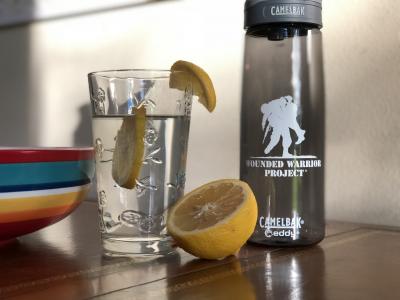Hydration 101: Drink to Your Health and Replenish Water During the Heat of Summer

By James Herrera – Physical Health & Wellness Director, Wounded Warrior Project
Is the heat making you feel a little cranky? You might not realize you’re dehydrated. Even at low levels, dehydration can put a strain on your energy and mood.
It’s easy to lose fluids quickly in the heat of summer. And if you don’t replace lost fluids, you get dehydrated, affecting your cognitive functions, temperament, and ability to engage in day-to-day activities.
It’s vital to drink water throughout the day. There’s no one-size-fits-all formula that applies to everybody; the important thing is to make a healthy habit of adjusting your water intake based on your activity – regardless of whether you feel thirsty at the moment.
Whether you live in a dry or humid climate, reach for the water bottle periodically. When you exercise in dry heat, your sweat evaporates fast, and you might not realize how quickly you’re losing water.
In humid weather, you have physical warning – sweating so much you can almost wring water out of your clothes. In either situation, it’s important to replenish the fluids you’re losing.
If you need to remind yourself to drink water, go ahead and set a timer. Take sips of water every 30 minutes to an hour to introduce the habit; keep the water bottle within eyesight.
Here are other ways to stay hydrated:
- Drink water before, during, and after outdoor exercise. Staying hydrated will help you maintain a normal body temperature. Avoid caffeinated and sugary beverages.
- Eat hydrating foods. Snack on cantaloupe, tomatoes, or cucumbers. Eat more green salads to take advantage of the water content in lettuce and veggies.
- Natural electrolytes. Some water-rich foods also help you replenish electrolytes and balance your salt and potassium. Try bananas, watermelon, and avocado. Skip the sugary sports drinks.
- Always carry a bottle of water. Access to water will help you increase water intake. Drink a glass of water with each meal. It’s normal to feel the need to urinate every three hours. Your urine should be a light color like lemonade, not dark like apple juice.
- Spruce up with infused water. If your water tastes dull and boring, invigorate your hydration habit with a zest of lemon, slice of cucumber, and sprig of mint. You’ll be adding a bit of flavor and hint of aroma.
- Drink water when you’re in the water. Some activities – like swimming – are great exercise that cause you to lose fluids like any other type of exercise. Be mindful of feeling dizzy after swimming laps in the pool. You’re still sweating when you’re swimming. Bring your water bottle to the pool.
For those with military training, discipline works in your favor when it comes to nutrition and hydration. One quirky thing, however, is that now you have the freedom to listen to your body.
You don’t have to wait for direction to take a water break. Pay attention to how your body feels.
In the same way that you’re mindful about your water intake, help children and older adults pay close attention to signs of dehydration; they are more prone to dehydration and often need help monitoring their fluid intake.
Watch out for these signs:
- Fainting
- Fatigue
- Confusion
- Dark-colored urine
- Dizziness
- Headache
- Muscle cramps
- Excessive sweating
- Rapid heartbeat
- Nausea, vomiting, or diarrhea
- Pale skin, sunken eyes
Maintaining healthy habits is one of many challenges warriors face when returning to civilian life. Years of regimented physical training and a restricted diet contrast with the variety of choices waiting at home.
Wounded warriors of this generation can take charge of their health by registering with Wounded Warrior Project® (WWP) and participating in online classes like Hydration 101, offered through the Physical Health & Wellness program. Learn about WWP’s other free wellness opportunities, in-person and online classes, coaching, and health clinics for warriors and caregivers at https://www.woundedwarriorproject.org/programs/physical-health-wellness.
About Wounded Warrior Project
Since 2003, Wounded Warrior Project® (WWP) has been meeting the growing needs of warriors, their families, and caregivers – helping them achieve their highest ambition. Learn more: https://newsroom.woundedwarriorproject.org.